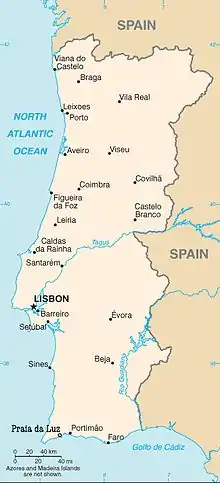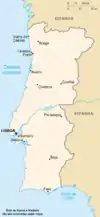Portugal
English

Alternative forms
- Portingale (obsolete)
- Portugall (obsolete)
Etymology
Borrowed from Portuguese Portugal, from Latin Portucale < Portus Cale (former name of what is now the city of Vila Nova de Gaia), from portus + Callus, which is disputed:
- From the name of the Gallaeci, a Celtic tribe of Iberia.
- From Latin calidus (“warm”).
- From Ancient Greek Καλλίς (Kallís, “Beautiful”), referring to the Douro valley; see καλός (kalós, “beautiful”).
- An Iberian pronunciation of Ancient Greek Γαῖα (Gaîa, “goddess of the Earth”).
Pronunciation
- (Received Pronunciation) IPA(key): /ˈpɔːt͡ʃəɡəl/, /ˈpɔːtjəɡəl/
- (General American) IPA(key): /ˈpɔɹt͡ʃəɡəl/
Audio (US) (file) - (General American, rare) IPA(key): /ˈpɔɹtuɡɑːl/
Proper noun
Portugal
- A country in Southern Europe, on the Iberian Peninsula. Official name: Portuguese Republic
Quotations
- For quotations using this term, see Citations:Portugal.
Synonyms
Derived terms
Translations
Noun
Portugal (plural Portugals)
- (now rare) A Portuguese person.
- 1603, Michel de Montaigne, chapter 40, in John Florio, transl., The Essayes […], book I, London: […] Val[entine] Simmes for Edward Blount […], →OCLC:
- Some became Christians, from whose faith and race, even at this day (for it is an hundred yeares since) few Portugalls assure themselves; although custome and length of time be much more forcible counsellors unto such mutations than any other compulsion.
-
See also
- Portugal § Etymology on Wikipedia
- (countries of Europe) country of Europe; Albania, Andorra, Armenia, Austria, Azerbaijan, Belarus, Belgium, Bosnia and Herzegovina, Bulgaria, Croatia, Cyprus, Czech Republic, Denmark, Estonia, Finland, France, Georgia, Germany, Greece, Hungary, Iceland, Ireland, Italy, Kazakhstan, Latvia, Liechtenstein, Lithuania, Luxembourg, Malta, Moldova, Monaco, Montenegro, Netherlands, North Macedonia, Norway, Poland, Portugal, Romania, Russia, San Marino, Serbia, Slovakia, Slovenia, Spain, Sweden, Switzerland, Turkey, Ukraine, United Kingdom, Vatican City
- Countries of the world
References
- Roberts, Edward A. (2014) A Comprehensive Etymological Dictionary of the Spanish Language with Families of Words based on Indo-European Roots, Xlibris Corporation, →ISBN
Basque
Declension
| indefinite | |
|---|---|
| absolutive | Portugal |
| ergative | Portugalek |
| dative | Portugali |
| genitive | Portugalen |
| comitative | Portugalekin |
| causative | Portugalengatik |
| benefactive | Portugalentzat |
| instrumental | Portugalez |
| inessive | Portugalen |
| locative | Portugalgo |
| allative | Portugalera |
| terminative | Portugaleraino |
| directive | Portugalerantz |
| destinative | Portugalerako |
| ablative | Portugaldik |
| partitive | Portugalik |
| prolative | Portugaltzat |
Derived terms
Related terms
Catalan
Etymology
From Latin Portucale < Portus Cale, former name of what is now the city of Vila Nova de Gaia.
Pronunciation
See also
- Lusitània (“Lusitania”)
Cebuano
Etymology
From Spanish Portugal. Also from Portuguese Portugal, from Old Galician-Portuguese Portugal, from Latin Portus Cale, former name of what is now the city of Vila Nova de Gaia.
Proper noun
Portugal
- Portugal (a country in Southern Europe)
- a surname from Portuguese
- a male given name from Portuguese
Quotations
For quotations using this term, see Citations:Portugal.
Central Huasteca Nahuatl
Derived terms
- (Portuguese):
- portuguéstlakatl
- portuguéstlajtoli
Central Nahuatl
Pronunciation
- IPA(key): /poɾtuˈɡal/
Derived terms
- (Portuguese):
- portugaltecatl (Amecameca)
- portuguéstlacatl (Cholula)
- portugallacatl (Milpa Alta)
References
- Mancilla Sepúlveda, Héctor. (2000) Lecciones de Nahuatl, Hirata Editorial, México DF.
Classical Nahuatl
Etymology
Borrowed from Spanish Portugal, from Latin Portus Cale, former name of what is now the city of Vila Nova de Gaia.
Pronunciation
- IPA(key): /poɾtuˈɡal/
Derived terms
- (Portuguese):
- portugallâcà, portuguéstin (obsolete)
- portugués
- portugallacatl
Danish
Etymology
Borrowed from Portuguese Portugal, from Latin Portus Cale, former name of what is now the city of Vila Nova de Gaia.
Related terms
Dutch
Etymology
Borrowed from Portuguese Portugal, from Latin Portus Cale, former name of what is now the city of Vila Nova de Gaia.
Pronunciation
- IPA(key): /ˈpɔrtyɣɑl/
Audio (file)
Franco-Provençal
French
Etymology
Borrowed from Portuguese Portugal, from Latin Portus Cale.
Pronunciation
- IPA(key): /pɔʁ.ty.ɡal/
Audio (file)
Derived terms
See also
- (countries of Europe) pays de l'Europe; Albanie, Allemagne, Andorre, Arménie, Autriche, Azerbaïdjan, Belgique, Biélorussie, Bosnie-Herzégovine, Bulgarie, Chypre, Cité du Vatican, Croatie, Danemark, Espagne, Estonie, Finlande, France, Géorgie, Grèce, Hongrie, Irlande, Islande, Italie, Kazakhstan, Lettonie, Liechtenstein, Lituanie, Luxembourg, Macédoine du Nord, Malte, Moldavie, Monaco, Monténégro, Norvège, Pays-Bas, Pologne, Portugal, République tchèque, Roumanie, Royaume-Uni, Russie, Saint-Marin, Serbie, Slovaquie, Slovénie, Suède, Suisse, Turquie, Ukraine (Category: fr:Countries in Europe)
Galician
Etymology
From Old Galician-Portuguese Portugal, from Latin Portucale < Portus Cale, former name of what is now the city of Vila Nova de Gaia.
Related terms
German
Etymology
Borrowed from Portuguese Portugal, from Latin Portus Cale, former name of what is now the city of Vila Nova de Gaia.
Pronunciation
- IPA(key): [ˈpɔɐ̯tuɡal]
Audio (file)
Proper noun
Portugal n (proper noun, genitive Portugals or (optionally with an article) Portugal)
- Portugal (a country in Southern Europe)
Derived terms
- Portugiese
- Portugieser
- portugiesisch
- Portugiesisch
Further reading
- “Portugal” in Digitales Wörterbuch der deutschen Sprache
Ido
Pronunciation
- IPA(key): /porˈtuɡal/
See also
- (countries of Europe) lando di Europa; Albania, Andora, Armenia, Austria, Azerbaijan, Bielorusia, Belgia, Bosnia e Herzegovina, Bulgaria, Kroatia, Chipro, Chekia, Dania, Estonia, Finlando, Francia, Gruzia, Germania, Grekia, Hungaria, Islando, Irlando, Italia, Kazakstan, Latvia, Liechtenstein, Lituania, Luxemburgia, Macedonia, Malta, Moldova, Monako, Montenegro, Nederlando, Norvegia, Polonia, Portugal, Rumania, Rusia, San-Marino, Serbia, Slovakia, Slovenia, Hispania, Suedia, Suisia, Turkia, Ukraina, Unionita Rejio, Vatikano
Indonesian
Etymology
From Malay Portugal, from Classical Malay البرتغال (Portugal), from Portuguese Portugal, from Latin Portus Cale, former name of what is now the city of Vila Nova de Gaia.
Pronunciation
- IPA(key): [pɔrˈtu.ɡal]
- Hyphenation: Por‧tu‧gal
Related terms
Further reading
- “Portugal” in Kamus Besar Bahasa Indonesia, Jakarta: Language Development and Fostering Agency — Ministry of Education, Culture, Research, and Technology of the Republic Indonesia, 2016.
Livonian
Alternative forms
Pronunciation
- IPA(key): /portuɡɑl/
Proper noun
Portugal
- Portugal (a country in Southern Europe)
- Tiit-Rein Viitso, Valts Ernštreits (2012–2013), Līvõkīel-ēstikīel-lețkīel sõnārōntõz, Tartu, Rīga: TÜ, LVA
- Portugal – Portugal – Portugāle
- Portugal – Portugal – Portugal
- Portugal – Portugal – Portugāle
- Tiit-Rein Viitso, Valts Ernštreits (2012–2013), Līvõkīel-ēstikīel-lețkīel sõnārōntõz, Tartu, Rīga: TÜ, LVA
Declension
| singular (ikšlug) | plural (pǟgiņlug) | |
|---|---|---|
| nominative (nominatīv) | Portugal | – |
| genitive (genitīv) | Portugal | – |
| partitive (partitīv) | Portugalt | – |
| dative (datīv) | Portugalõn | – |
| instrumental (instrumentāl) | Portugalõks | – |
| illative (illatīv) | Portugalõ | – |
| inessive (inesīv) | Portugalõs Portugals |
– |
| elative (elatīv) | Portugalõst Portugalst |
– |
Luxembourgish
Pronunciation
Audio (file)
Derived terms
- Portugis
- Portugisin
- Portugiser
- portugisesch
- Portugisesch
Malay
Etymology
From Portuguese Portugal, from Latin Portus Cale, former name of what is now the city of Vila Nova de Gaia.
Pronunciation
- IPA(key): /po(r)tuɡal/
- Rhymes: -uɡal, -ɡal, -al
See also
Mezquital Otomi
Norwegian Bokmål

Etymology
Borrowed from Portuguese Portugal, from Latin Portus Cale, former name of what is now the city of Vila Nova de Gaia.
Pronunciation
(Urban East Norwegian) IPA(key): /ˈpʰùʈʉɡɑːl/
Related terms
Norwegian Nynorsk
Etymology
Borrowed from Portuguese Portugal, from Latin Portus Cale, former name of what is now the city of Vila Nova de Gaia.
Related terms
Old Galician-Portuguese
Alternative forms
- Portugale
Etymology
From Latin Portucale < Portus Cale, former name of what is now the city of Vila Nova de Gaia.
Pronunciation
- IPA(key): /poɾ.tu.ˈɡal/
Proper noun
Portugal
- (Kingdom of) Portugal.
- 1214, The will of King Afonso II of Portugal, King Afonso II of Portugal:
- eu rei don afonſo pela gracia de deuſ rei de portugal. ſeendo ſano e ſaluo temẽte o dia de mia morte […]
- I, King Afonso, by the grace of God king of Portugal, being safe and sound, fearing the day of my death […]
- eu rei don afonſo pela gracia de deuſ rei de portugal. ſeendo ſano e ſaluo temẽte o dia de mia morte […]
- 13th century CE, Alfonso X of Castile, Cantigas de Santa Maria, E codex, cantiga 224 (facsimile):
- Como ſanta maria de Terena q̇ e no Reino de Portugal, reſſucitou hũa menỹa morta.
- How Holy Mary of Terena, which is in the Kingdom of Portugal, resurrected a dead girl.
- Como ſanta maria de Terena q̇ e no Reino de Portugal, reſſucitou hũa menỹa morta.
- 1214, The will of King Afonso II of Portugal, King Afonso II of Portugal:
Portuguese

Alternative forms
- Purtugal (obsolete)
Etymology
From Old Galician-Portuguese Portugal, from Latin Portucale < Portus Cale, former name of what is now the city of Vila Nova de Gaia.
Pronunciation
- (Brazil) IPA(key): /poʁ.tuˈɡaw/ [poh.tuˈɡaʊ̯]
- (São Paulo) IPA(key): /poɾ.tuˈɡaw/ [poɾ.tuˈɡaʊ̯]
- (Rio de Janeiro) IPA(key): /poʁ.tuˈɡaw/ [poχ.tuˈɡaʊ̯]
- (Southern Brazil) IPA(key): /poɻ.tuˈɡaw/ [poɻ.tuˈɡaʊ̯]
- (Portugal) IPA(key): /puɾ.tuˈɡal/ [puɾ.tuˈɣaɫ]
- Rhymes: (Portugal) -al, (Brazil) -aw
- Hyphenation: Por‧tu‧gal
Proper noun
Portugal m (gender only indicated by adjectives, see usage note below)
Usage notes
The word Portugal is masculine when referred to by adjectives, but it can never be indicated by articles. Therefore phrases like "o Portugal", "no Portugal" etc. don't exist; articleless forms such as "Portugal" and "em Portugal" are used instead. This peculiarity applies to a few other place names such as Angola, Moçambique, Cabo Verde, São Tomé e Príncipe, Essuatíni, Macau, Timor Leste, Andorra, Israel, São Salvador, Aragão, Castela and Leão. It also applies to most cities.
Derived terms
Further reading
 Portugal on the Portuguese Wikipedia.Wikipedia pt
Portugal on the Portuguese Wikipedia.Wikipedia pt
Serbo-Croatian
Alternative forms
- Portùgālija (Bosnian, Serbian)
Etymology
Borrowed from Portuguese Portugal, from Latin Portus Cale, former name of what is now the city of Vila Nova de Gaia.
Pronunciation
- IPA(key): /pôrtuɡal/
- Hyphenation: Por‧tu‧gal
Declension
| singular | |
|---|---|
| nominative | Portugal |
| genitive | Portugala |
| dative | Portugalu |
| accusative | Portugal |
| vocative | Portugale |
| locative | Portugalu |
| instrumental | Portugalom |
Spanish
Etymology
From Latin Portucale < Portus Cale, former name of what is now the city of Vila Nova de Gaia.
Pronunciation
- IPA(key): /poɾtuˈɡal/ [poɾ.t̪uˈɣ̞al]
Audio (file) - Rhymes: -al
- Syllabification: Por‧tu‧gal
Derived terms
- portugalés
- portugalujo
- portugués
- portuguesada
- portuguesismo
Swedish
Pronunciation
Audio (file)
Related terms
Tagalog
Pronunciation
- Hyphenation: Por‧tu‧gal
- IPA(key): /poɾtuˈɡal/, [poɾ.tʊˈɣal]
Proper noun
Portugál (Baybayin spelling ᜉᜓᜇ᜔ᜆᜓᜄᜎ᜔)
- Portugal (a country in Southern Europe)
- 1949, Sa kapakanaan ng kapayapaan at kaunlarang pandaigdig:
- Ang mga bansang naunang lumagda sa kasunduang ito ay ang Estados Unidos, Kanada, Inglatera, Pransiya, Olanda, Belhika, Norwega, Luksemburgo, Italya, Dinamarka, Islandiya at Portugal.
- (please add an English translation of this quote)
-
Proper noun
Portugál (Baybayin spelling ᜉᜓᜇ᜔ᜆᜓᜄᜎ᜔)
- a surname from Spanish deriving from the name of the country
Statistics
According to data collected by Forebears in 2014, Portugal is the 1,530th most common surname in the Philippines, occurring in 7,025 individuals.